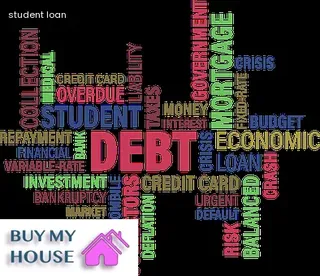Forbearance is a type of financial relief that can be used by individuals who are struggling with loan payments or other debts. It allows the borrower to temporarily stop making payments, reduce monthly payments, or extend the length of time for repayment.
During this time period, no interest will accrue and no late fees will be charged. To qualify for forbearance, the borrower must demonstrate financial hardship which could include loss of income due to illness, job loss, or other unforeseen circumstances.
Forbearance may also apply to student loans and mortgages in certain cases. The lender has the right to approve or deny any request for forbearance and they may require proof of hardship before granting it.
Once approved, the lender may still report the debt as delinquent during forbearance which could have a negative impact on the borrower’s credit score. Depending on their situation, borrowers should consider all options before opting for forbearance as it can have long-term consequences on their credit rating and future borrowing capacity.

The act of loan forbearance can provide a huge relief for individuals who are struggling to make loan payments, however, it can also have an impact on their credit score. Although this form of debt relief reduces the amount due each month and suspends payment collection efforts, it is important to understand that interest still continues to accrue and must be accounted for.
In addition, while loan forbearance may help prevent delinquent or missed payments from appearing on credit reports in the short term, it still has the potential to reduce a borrower’s credit score over time. On the positive side, lenders may report loan forbearance as ‘current’ or ‘paid as agreed’ if the borrower makes regular payments during the period of deferment.
This can help keep their credit score intact and prevent them from being viewed as a high-risk borrower by lenders. Therefore, borrowers should consider all of these factors when deciding whether or not to pursue loan forbearance as an option for reducing debt.
Forbearance is a common debt payment option that allows borrowers to temporarily reduce or suspend their payments on certain types of debts. Generally, the most common type of debt that qualifies for forbearance is federal student loans.
In addition, some private lenders may also offer forbearance on other types of debt such as mortgages and personal loans. Forbearance can be beneficial for those who are facing temporary financial hardship and need some relief from their current obligations.
It is important to note that credit card debt does not typically qualify for forbearance and interest will continue to accumulate during the period of forbearance. Some lenders may allow borrowers to suspend payments on their auto loans but this should be confirmed with the lender prior to making any decisions.
Ultimately, each borrower's situation will vary based on the type of loan they have and the terms agreed upon with their lender. Understanding which debts qualify for forbearance can help individuals make an informed decision about how best to manage their current financial situation while exploring the impact of loan forbearance on credit scores.

When considering loan forbearance, it is important to understand the difference between deferment and forbearance and how they may affect your credit score. Deferment is a temporary suspension of payment on a loan that is approved by the lender.
This often occurs if you are returning to school, unemployed, or have an economic hardship. During deferment, interest does not accrue on federally guaranteed loans such as Stafford Loans and Perkins Loans but may accrue on private loans.
Forbearance is also a temporary suspension of payment on a loan but for different reasons than deferment and is granted at the discretion of the lender. If you are experiencing financial difficulty due to illness or other extenuating circumstances, the lender may grant forbearance for up to 12 months with the option for renewal.
During this period interest will accrue but payments are not required until after forbearance ends. Loan forbearance can have both positive and negative effects on your credit score depending on what type it is and how long it lasts; however, if you take advantage of this opportunity correctly, it can help you get back on track with your finances while avoiding delinquency or default.
When it comes to managing debt and protecting your credit score, loan forbearance can be a helpful tool. Credit card forbearance is a form of debt relief that allows borrowers to temporarily stop making payments on their loans or reduce the size of their payments for a certain period of time.
This can provide much-needed financial relief for those struggling with payments due to job loss, illness, or other circumstances. However, it's important to understand that loan forbearance does come with consequences.
While it will temporarily pause collection activities from creditors and help you avoid late payment fees or penalties, your credit score may still take a hit. In addition, interest may continue to accrue during the forbearance period which could lead to an increase in the amount you owe when payments resume.
It's also important to know that lenders may require documentation as proof of hardship before approving a request for loan forbearance. Finally, be sure to speak with your lender before taking any action so they can explain all available options and help you make an informed decision about what’s best for your financial situation.

As the economic landscape of the United States continues to shift and change, one of the most important tools for financial health is loan forbearance. The ability to temporarily pause payments on a loan can be an invaluable resource for many individuals struggling to make ends meet in the face of job loss or other financial hardship.
However, there are still questions surrounding how exactly loan forbearance affects an individual’s credit score. Understanding these impacts is key for any individual considering using this tool in order to ensure their long-term financial stability.
To better understand the impact of loan forbearance on credit scores, it’s important to consider all available information regarding how lenders view this type of agreement and how it is reported on an individual’s credit report. It is also essential to take into account how different types of loans are affected by forbearance as well as the potential consequences that can arise from working out a forbearance plan with a lender.
Finally, although there has been some research done on this topic, further examination and data collection could provide more insight into the effects that loan forbearance has on one’s credit score over time.
Student loan forbearance is an important option for many individuals struggling to repay their student loans. The choice to pursue a loan forbearance can have a significant impact on a person’s credit score, but it is essential to weigh all the pros and cons before deciding whether this type of loan arrangement is right for you.
It is important to understand the details of how loan forbearance works and its potential impacts on your credit score, as well as other factors such as the length of time it will take you to pay off your loans. Borrowers should also be aware that while there are some benefits associated with loan forbearance, such as reduced payments or a longer repayment period, there may also be risks, such as late fees or even penalties for not meeting repayment terms.
Additionally, borrowers should keep in mind that any changes made to their loan agreement could affect their eligibility for other forms of financial aid. Taking all these considerations into account can help borrowers make an informed decision about whether loan forbearance is the best option for them.

When a borrower takes out a loan, their credit score is impacted. Loan forbearance is an agreement between the lender and the borrower that allows the borrower to temporarily postpone or reduce their monthly payments.
This agreement can have a significant impact on one’s credit score. It is important to understand how loan forbearance will affect your credit score before entering into any agreement with your lender.
Credit scores will typically decrease when a loan enters forbearance as missed payments are reported to the credit bureau. Additionally, it may be more difficult for borrowers with loans in forbearance to qualify for new loans or lines of credit due to their decreased credit score.
On the other hand, some lenders may offer additional benefits such as waiving late payment fees which could help improve one’s credit score over time if payments are made on time and regularly. Ultimately, whether loan forbearance will have a positive or negative impact on your credit score depends on your ability to make timely payments during the period of forbearance.
When approaching lenders and creditors about loan forbearance or deferred payments, it is important to get definitive information from them. Unfortunately, this process can be extremely daunting for many individuals as the details are often complicated and confusing.
To make things easier, borrowers should be prepared with questions before speaking to their creditor. Questions such as how long the forbearance period will last, what will happen if the borrower misses payments within the period, and if interest rates will change should all be asked.
Additionally, it is important to ask if the lender or creditor reports missed payments during the forbearance period to credit bureaus. This information can help shed light on potential impacts of forbearance on an individual’s credit score.
It is also important to keep in mind that creditors have different policies when it comes to loan forbearance or deferred payments. Thus, borrowers should research their options before committing and make sure they understand the terms and conditions of any agreement they reach with their lender or creditor.

The coronavirus pandemic has caused a tremendous amount of financial hardship for people all over the world, and with it, an unprecedented influx of loan forbearance requests. Forbearance is a form of relief for those unable to make their monthly payments on time due to the economic impact of COVID-19.
While loan forbearance can be a great short-term solution for resolving debt obligations, there are still some important long-term considerations to be aware of when it comes to credit score. One consequence of loan forbearance is that many lenders report missed payments or late payments during the period of forbearance as “current” instead of “delinquent” on credit reports.
This is because while loan forbearance can help borrowers avoid defaulting on debt, it does not necessarily erase existing debt or absolve borrowers from making future payments. As such, loan forbearance could potentially have an adverse effect on one's credit score if they fail to catch up on missed payments after their period of forbearance ends.
That's why borrowers should take proactive steps now to ensure that they are able to keep up with their debts and protect their credit score in the long run. These steps may include reviewing one's current financial situation and budgeting appropriately, considering different payment options like consolidation or refinancing loans, negotiating with creditors for more favorable terms or lower interest rates, and staying updated regarding federal programs like the CARES Act that may provide additional assistance.
Navigating the Mortgage Loan Forbearance Process can be a daunting task. Understanding the details of loan forbearance and its impact on your credit score is essential in order to make an informed decision.
This article will dive into the specifics of loan forbearance, what it is, how it works, and ultimately how it affects your credit score. Loan forbearance allows borrowers who are struggling financially to reduce or suspend their monthly mortgage payments for a specific period of time.
It gives borrowers time to get back on their feet financially without having to worry about defaulting on their mortgage payments. During this period of forbearance, lenders are prohibited from reporting negative credit activity related to late or missed payments.
However, it's important to note that interest continues to accrue during this period which may lead to an increased balance over time. Additionally, once the term is up, borrowers must begin making payments again in order for their credit scores not to be negatively impacted.
Therefore, it's vital that those considering taking advantage of a loan forbearance understand both the short-term and long-term implications before making a decision.

Auto loan forbearance or deferred payment is a process of allowing borrowers to temporarily stop making payments on their loan for a certain period of time. This option can provide financial relief for borrowers who are unable to make loan payments due to unforeseen circumstances like job loss, income reduction, or health issues.
While loan forbearance can provide temporary financial relief and possibly prevent defaulting on the loan, it’s important to understand that it can also have an impact on credit scores. A borrower must consider both the short and long-term effects of loan forbearance before taking advantage of this option.
One potential risk is that the lender may report missed payments during the period of forbearance, which could result in a decrease in the borrower’s credit score. It’s also important to remember that any interest accrued during the period of forbearance will be added onto the amount owed on the loan once payment resumes.
Lastly, if a borrower defaults on their loan after taking advantage of deferment or forbearance, they could face further penalties such as wage garnishment from creditors or damaged credit ratings.
Loan forbearance is a process that allows individuals to suspend or reduce their monthly loan payments for a predetermined period of time. During this period, the loan servicer will not initiate foreclosure proceedings or report any negative activity to the credit bureaus.
It is important to understand how the loan forbearance process works and how it impacts your credit score. Before entering into a loan forbearance agreement, you should know what type of debt you are dealing with and how long the forbearance period will last.
Additionally, it is important to understand if there are any fees associated with the agreement and if interest will continue to accrue during the forbearance period. After considering all of these factors, be sure to review your credit report before and after entering into an agreement to see what effect it has had on your score.
While loan forbearance can provide temporary relief from making payments, it can also have lasting implications on your credit score which should be taken into account before deciding whether or not this option is right for you.

Utility bills and property taxes are significant expenses for many households, however the current economic climate has made these payments difficult to manage. Loan forbearance allows individuals to defer payment of loan balances, but how does this impact credit scores? It is important to explore the relationship between utility bills, property tax loans and loan forbearances in order to better understand the effects that deferring payment can have on an individual's credit score.
When borrowers agree to a loan forbearance, their creditors may report the deferred amount as a charge-off or delinquent debt on the borrower's credit report. Additionally, unpaid utility bills and property taxes can also be reported as late payments, negatively impacting the consumer's score.
On the other hand, if an individual is able to keep up with their utility bill or property tax payments while using loan forbearance to manage other debts, their credit score could remain unaffected since these types of loans are typically not reported on a consumer's credit history. Ultimately, understanding how loan forbearances can affect one's credit score when combined with utility bills and property tax loans is key for making informed financial decisions.
When considering whether or not to pursue a loan forbearance or deferred payment, it is important to look at the big picture. Most people are aware that loan forbearance and deferred payments can provide immediate relief in terms of alleviating financial stress.
However, it is important to understand that this can have an impact on credit scores. It is possible for lenders to report a borrower's loan as delinquent if the borrower enters into such an agreement with their lender.
This can affect a person's credit score and even result in higher interest rates in the future when seeking additional loans. Additionally, there are also certain fees associated with entering into a forbearance agreement which should be taken into consideration when weighing whether or not it is a viable option.
Ultimately, there may be other alternatives available to borrowers which could potentially provide more beneficial long-term outcomes than loan forbearance or deferred payments. Thus, understanding the full ramifications of any decisions made regarding loans can help individuals make better informed decisions about their future financial security.

The decision to opt for a loan forbearance or deferred payment plan can have a significant impact on one’s credit score. It is important to understand that these plans are not necessarily the best option for everyone and should be explored carefully before deciding on a course of action.
Afterward, financial planning needs to take place in order to ensure that the effects of the chosen plan do not lead to further financial hardship. First and foremost, one must evaluate their current situation and determine whether their income will be sufficient enough to cover any additional fees associated with a loan forbearance or deferred payment plan.
Additionally, it is important to research the potential consequences of such an agreement, including how it might affect future borrowing opportunities and creditworthiness. Finally, it is important to remain aware of any changes in interest rates and adjust payments accordingly in order to maximize the benefit of the loan forbearance or deferred payment option.
Taking these steps can help ensure that one remains financially secure after making this critical decision.
One of the best strategies to protect your credit score during times of loan forbearance or deferred payments is to keep up with other obligations. Paying rent, utilities, and other debts on-time can help you maintain a good credit score.
Additionally, it is important to communicate with lenders and creditors and make them aware of your current financial situation. Many lenders offer special arrangements that can help borrowers avoid late payment penalties, which can greatly benefit their overall credit score.
Additionally, it is important to stay aware of changes in the loan terms that could potentially cause negative impacts on your credit score. Finally, if you are unable to make payments on loans due to temporary financial hardship, consider consolidating debt or refinancing existing loans at lower interest rates which may reduce monthly payments and help improve your credit score.

Although loan forbearance and deferred payments are often seen as solutions to help protect credit scores, they are not the only options. There are other alternatives worth exploring that could potentially help maintain or improve a credit score without resorting to such measures.
For instance, debt consolidation is an option worth considering as it might be more cost effective in the long run. Another alternative is to work with lenders directly to customize payment plans that suit one’s budget and situation.
It is also possible to negotiate for lower interest rates or even waive off late fees if the borrower has had a good track record of paying on time. Finally, if all else fails, transferring the debt to a 0% interest rate card can be beneficial in terms of easing out cash flow issues for a short period of time.
As more borrowers are struggling to make payments due to financial hardships caused by the pandemic, loan forbearance and deferred payments have become popular options. However, many questions remain about the impact of these measures on credit scores.
Forbearance and deferred payments can be beneficial in the short term, but they can also have a long-term effect on your credit score. It is important to understand how these programs work, as well as their potential impact on your credit score before making any decisions.
When considering loan forbearance or deferred payments, it is important to discuss all possible options with your lender and research the potential effects on your credit score before deciding what’s best for you. While some lenders may not report late payments or delinquencies during a period of forbearance or deferment, others may still do so which could lead to a decrease in your credit score.
Additionally, some lenders may report that you are delinquent even if you are not in default due to missed payments when using forbearance or deferment programs. That being said, some borrowers have found that taking advantage of loan forbearance and deferment can increase their credit scores over time as it allows them to stay current on their debt obligations while providing temporary financial relief.
Ultimately, each situation is unique and it is important to carefully consider all of your options before making a decision that could potentially impact your credit score for years to come.
It's important to consider the potential impact of loan forbearance on your credit score. When a borrower is unable to make payments on a loan, their lender may offer a forbearance, which allows them to temporarily stop making payments or reduce their payments for an agreed-upon period of time.
But does entering into a forbearance agreement hurt your credit score? In general, it's likely that being in forbearance will have some negative impact on your credit score. While the exact effects vary depending on the situation and type of loan, most lenders report late payments associated with forbearance agreements as delinquent accounts.
This is reported to the major credit bureaus, which can result in a drop in your credit score. Additionally, interest may still accrue on your loan during this period even if you're not making payments, which may increase the total balance owed and could negatively affect your debt-to-credit ratio if you don't take other steps to manage it.
Ultimately, it's important to weigh all the risks and benefits involved before deciding whether or not a forbearance agreement is right for you.

Forbearance, while a great option for those struggling financially to reduce or suspend loan payments, can have a negative impact on credit scores. When the payment is not made, it is reported as delinquent and can remain on the credit report for seven years.
This can significantly lower one’s credit score and make it difficult to obtain new credit in the future. Additionally, interest continues to accrue during forbearance periods, increasing the total amount owed and leading to larger future payments.
Furthermore, depending on an individual’s situation, there may be fees associated with forbearance that are added to the total amount of debt. Last but not least, it is important to note that if payments are suspended for too long during forbearance periods, lenders could start legal proceedings against borrowers—and this could lead to wage garnishment or seizure of assets.
Therefore, it is important that individuals understand all potential negative outcomes before seeking loan forbearance as a solution.
Yes, student loan forbearance can affect your credit score. When you enter into a loan forbearance agreement with your lender, the lender may report it to the credit bureaus, which can then lower your score.
The impact of loan forbearance on your credit depends on the type and amount of debt you have. Loans that are already delinquent or in default will likely have a bigger impact than loans that are current and paid as agreed.
Additionally, if you have other existing debts such as credit card balances or car payments, they may also be impacted by the addition of a loan forbearance. It is important to understand that even though your payment amount is reduced during a loan forbearance period, interest still accrues and is added to the principal balance of the loan.
This could result in an increase in total debt and could further negatively impact your credit score. However, taking advantage of loan forbearance when necessary can provide some relief from financial stress while you work towards improving your overall financial situation.
When it comes to loan forbearance and its impact on credit scores, many borrowers have questions. Forbearance is an agreement between a borrower and lender which temporarily suspends payments or reduces them significantly for a predetermined period.
While this can be beneficial for the borrower in terms of addressing their financial situation, understanding how forbearance will affect their credit score is important. In some cases, loan forbearance can have a negative effect on a person’s credit score due to missed payments or late payments.
However, if the borrower continues to make all other payments on time, the impacts of loan forbearance may be minimal. Ultimately, the decision to pursue loan forbearance should be made with knowledge of how it will affect one’s credit score in addition to any other considerations.
A: According to Experian, forbearance can reduce or suspend your monthly payments on a loan or credit card. This could potentially have a negative impact on your credit score due to the resulting late payments being reported to the three major credit bureaus (Experian, TransUnion and Equifax). However, depending on the details of the forbearance agreement, lenders may not report missed payments and in some cases have agreed to not report any negative information about borrowers who are approved for forbearance.
A: Generally, lenders will report your forbearance status to the consumer reporting agencies. This information may stay on your credit report for up to seven years and could make it more difficult for you to refinance or take out new loans in the U.S. and America.

A: Theft and trademarks do not directly relate to forbearance affecting credit. However, if you have a loan with Fannie Mae and take advantage of forbearance, this could affect your credit score. Depending on the type of loan you have and the terms of the forbearance agreement, there may be negative impacts to your credit report due to missed payments or payment extensions.
A: Forbearance can have a negative impact on your credit, as lenders may report late payments to the credit bureaus even if you are in a forbearance program. Mortgage servicers and card issuers will also likely take into account the fact that you entered into a forbearance program when they consider your application for future loans or credit cards.
A: Participating in forbearance may temporarily have a negative impact on your credit score, but it is important to remember that lenders are aware of the current economic circumstances. If you communicate with your lender and remain current with other loan payments, the negative impact should be minimal and eventually improve.

A: Short sale and repayment plans can have a negative impact on your credit score, as they indicate to lenders that you are having difficulty meeting your financial obligations. Forbearance can also have an effect on your credit score, depending on the type of loan and how it is reported to the credit bureaus. Generally speaking, any type of loan modification or payment deferment will likely have a negative effect on your credit score. It is important to speak with your bank about any repayment options before making a decision.
A: Mortgage modifications that include forbearance can have a negative impact on your credit score, due to the decreased payment amount and increased loan length. However, if you're able to make timely payments during the forbearance period and stay current after the modification is complete, it should not have a long-term negative effect on your credit.
A: Forbearance can affect a homebuyer or homeowner's credit score by lowering it due to missed mortgage payments. It can also impact a person's ability to secure additional financing for their current mortgage or other loans in the future. Additionally, a homeowner may see an increase in their homeowners insurance premiums as a result of forbearance. Finally, if a homebuyer or homeowner is unable to make up missed payments after forbearance ends, they could face foreclosure and lose ownership of their home.
A: When you enter into a forbearance agreement with your lender, your VANTAGESCORE may be affected. The exact amount depends on your credit history and other factors, but in general, it could result in a lower score. This could make it more difficult to get approved for a loan through the VA.
A: Forbearance is a financial option available to individuals experiencing short-term financial hardship. While you may not need to make monthly payments during the forbearance period, interest will continue to accumulate on your loan balance. Additionally, depending on the type of forbearance and your lender's policy, forbearance may be reported on your credit report. Even if it's not reported, lenders may still see that you used forbearance when they pull your credit report. This could affect their decision when considering future loan applications or other forms of credit.
A: Forbearance can affect your credit because it indicates that you are experiencing financial difficulties and may not be able to make payments on time. This will be reported to the major credit bureaus, leading to a potential decrease in your credit score.